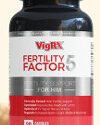Decoding Male Infertility: Unraveling the Secrets of Healthy Sperm
Male infertility affects a significant percentage of adult men, approximately 10%. While sperm often takes the blame for fertility issues, understanding the underlying reasons for unhealthy sperm can be quite challenging. Let’s explore some key factors influencing sperm health and ways to ensure a healthier outcome.
Unveiling the Culprits of Poor Sperm Health
Identifying the exact cause of poor sperm health can be a complex task due to multiple contributing factors. Nonetheless, medical experts have pinpointed five common reasons behind diminished sperm parameters:
- Smoking: Men who smoke are at high risk of damaging their sperm health. Cigarette toxins have been strongly linked to negative impacts on sperm count, semen volume, and sperm motility.
- Lack of Exercise: Engaging in regular aerobic exercise, particularly weight training, has shown positive effects on sperm health, but the lack of physical activity can hinder it.
- Poor Diet: Declining sperm counts globally have partially been attributed to our increasingly processed food-heavy diets. Evidence suggests that diets rich in fruits, vegetables, fish, and low-fat dairy products promote better-quality sperm.
- Alcohol and Drug Use: Long-term substance use has been linked to reduced semen quality, with daily alcohol consumption having a more significant impact than low to moderate drinking.
- Obesity: Obesity affects various semen parameters, including semen volume, sperm count, sperm motility, and abnormal sperm morphology.
The Influence of Age on Sperm Health
Men produce sperm throughout their entire lives. While age doesn’t significantly affect sperm counts or the number of sperm produced, certain parameters like sperm morphology and motility may be negatively impacted as men grow older. Genetic defects also become more common in children fathered by older men, possibly due to DNA fragmentation.
Understanding Fertility and Sperm Health
To achieve fertility, sperm must possess certain qualities evaluated through a standard laboratory semen analysis. These qualities include:
- Sperm Quantity: Men typically produce an impressive number of sperm in their lifetime, and a healthy ejaculation releases millions to billions of sperm cells. The baseline for healthy semen is around 15 million sperm per milliliter of ejaculate.
- Sperm Motility: For successful fertilization, at least 40 percent of sperm cells should exhibit forward movement. Recent research has shown that sperm tails move forward by rolling in circles rather than side-to-side wiggling.
- Sperm Morphology: Healthy sperm have a rounded head and a long, strong tail, which aids in their journey to fertilize the egg. Abnormally shaped sperm can hinder successful pregnancy.
Testing Sperm Health
Determining sperm health involves visiting a doctor and undergoing a lab test. Semen samples are collected, and trained technicians analyze various parameters, such as semen volume, sperm morphology, motility, pH level, sperm quantity, vitality, time to liquefaction, and white blood cell count. While home testing kits can offer limited insights, professional lab analysis remains the optimal choice for comprehensive results.
Conclusion: Prioritizing Overall Health for Healthy Sperm
Sperm quality is intricately connected to a man’s overall well-being. Emphasizing healthy lifestyle choices, including regular exercise, balanced diets, and abstaining from smoking, alcohol, and drug abuse, can significantly contribute to better sperm health and fertility.




